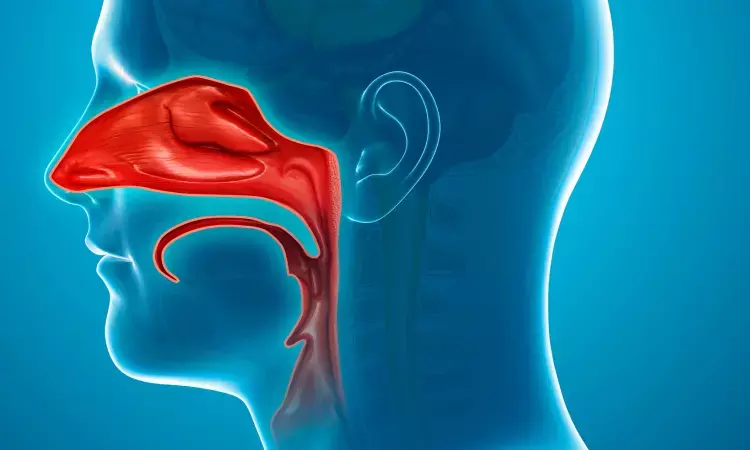- Home
- Medical news & Guidelines
- Anesthesiology
- Cardiology and CTVS
- Critical Care
- Dentistry
- Dermatology
- Diabetes and Endocrinology
- ENT
- Gastroenterology
- Medicine
- Nephrology
- Neurology
- Obstretics-Gynaecology
- Oncology
- Ophthalmology
- Orthopaedics
- Pediatrics-Neonatology
- Psychiatry
- Pulmonology
- Radiology
- Surgery
- Urology
- Laboratory Medicine
- Diet
- Nursing
- Paramedical
- Physiotherapy
- Health news
- Fact Check
- Bone Health Fact Check
- Brain Health Fact Check
- Cancer Related Fact Check
- Child Care Fact Check
- Dental and oral health fact check
- Diabetes and metabolic health fact check
- Diet and Nutrition Fact Check
- Eye and ENT Care Fact Check
- Fitness fact check
- Gut health fact check
- Heart health fact check
- Kidney health fact check
- Medical education fact check
- Men's health fact check
- Respiratory fact check
- Skin and hair care fact check
- Vaccine and Immunization fact check
- Women's health fact check
- AYUSH
- State News
- Andaman and Nicobar Islands
- Andhra Pradesh
- Arunachal Pradesh
- Assam
- Bihar
- Chandigarh
- Chattisgarh
- Dadra and Nagar Haveli
- Daman and Diu
- Delhi
- Goa
- Gujarat
- Haryana
- Himachal Pradesh
- Jammu & Kashmir
- Jharkhand
- Karnataka
- Kerala
- Ladakh
- Lakshadweep
- Madhya Pradesh
- Maharashtra
- Manipur
- Meghalaya
- Mizoram
- Nagaland
- Odisha
- Puducherry
- Punjab
- Rajasthan
- Sikkim
- Tamil Nadu
- Telangana
- Tripura
- Uttar Pradesh
- Uttrakhand
- West Bengal
- Medical Education
- Industry
Dupilumab associated with "highly favorable" outcomes in Type 2 Chronic Rhinosinusitis

Switzerland: A recent study published in Allergy, European Journal of Allergy and Clinical Immunology, predicted treatment outcome as "highly favorable" after one-week treatment of Type 2 Chronic Rhinosinusitis (T2CRS) patients with dupilumab.
On 26 June 2019, the US Food and Drug Administration approved Dupixent (dupilumab) to treat chronic rhinosinusitis in adults with nasal polyps. The approval was granted to Regeneron Pharmaceuticals. Polyps are growths on the inner lining of the sinuses. The prolonged inflammation of sinuses and nasal cavities often accompanies nasal polyps in T2CRS with no clarity on serological markers.
Dupilumab is the first-line treatment in such cases, mainly where nasal polyps are not controlled by intranasal steroids and require surgery and oral steroids. No data exist on factors that predict outcomes in dupilumab treatment.
Against the above background, a study was conducted by Lead researcher Soyka et al. with co-researcher Ryser to clinically assess ultra-short- and short-term outcomes for up to 90 days in patients on dupilumab treatment. The treatment response was identified using the clinical and serological markers, and the comparison was made with healthy controls (HC).
The critical points of the study are:
• A total of 30 patients were included.
• Serum sample collection was done on day 0 and 30 days of treatment.
• Olink was used to perform proteomic analyses.
• On day 7, there was an improvement in SinoNasalOutcomeTest-20 (SNOT-20) scores and the total nasal polyp score. The p-value was significant (p<0.05).
• A sensitivity of 86% with an improvement of 2.5 points was recorded (during the first visit).
• In comparison to HC, significant changes were reported in the proteomic analyses.
Dr. Michael B Soyka from the Department of Otorhinolaryngology at Head and Neck Surgery University and University Hospital Zurich said, "We identified OPG from the serum of patients who were treated with dupilumab. It is a significant finding which may contribute as the "predictor" of the clinical outcome in such patients.
Dr. Fabio S. Ryser from the Department of Immunology at University and University Hospital, Zurich, added, "We confirmed the predictive value of OPG in the second cohort."
The final conclusion from the researchers was, "we reported a highly associated favorable outcome after one week of dupilumab treatment. T2CRS-specific protein (dysregulated) in such patients can be identified with proteomic analyses, which are highly sensitive. Before initiating therapy in such patients, serum OPG should be detected to predict the treatment outcome."
References:
- Predicting Dupilumab Treatment Outcome in Patients with Primary diffuse Type 2 Chronic Rhinosinusitis.Michael B. Soyka,Fabio S. Ryser,Catrin Brühlmann,Danielle Fehr,Jacqueline Dülgeroglu,Peter Schmid-Grendelmeier,Marie-Charlotte Brüggen,Urs C. Steiner First published: 26 September 2022
- https://www.fda.gov/news-events/press-announcements/fda-approves-first-treatment-chronic-rhinosinusitis-nasal-polyps
BDS, MDS in Periodontics and Implantology
Dr. Aditi Yadav is a BDS, MDS in Periodontics and Implantology. She has a clinical experience of 5 years as a laser dental surgeon. She also has a Diploma in clinical research and pharmacovigilance and is a Certified data scientist. She is currently working as a content developer in e-health services. Dr. Yadav has a keen interest in Medical Journalism and is actively involved in Medical Research writing.
Dr Kamal Kant Kohli-MBBS, DTCD- a chest specialist with more than 30 years of practice and a flair for writing clinical articles, Dr Kamal Kant Kohli joined Medical Dialogues as a Chief Editor of Medical News. Besides writing articles, as an editor, he proofreads and verifies all the medical content published on Medical Dialogues including those coming from journals, studies,medical conferences,guidelines etc. Email: drkohli@medicaldialogues.in. Contact no. 011-43720751


